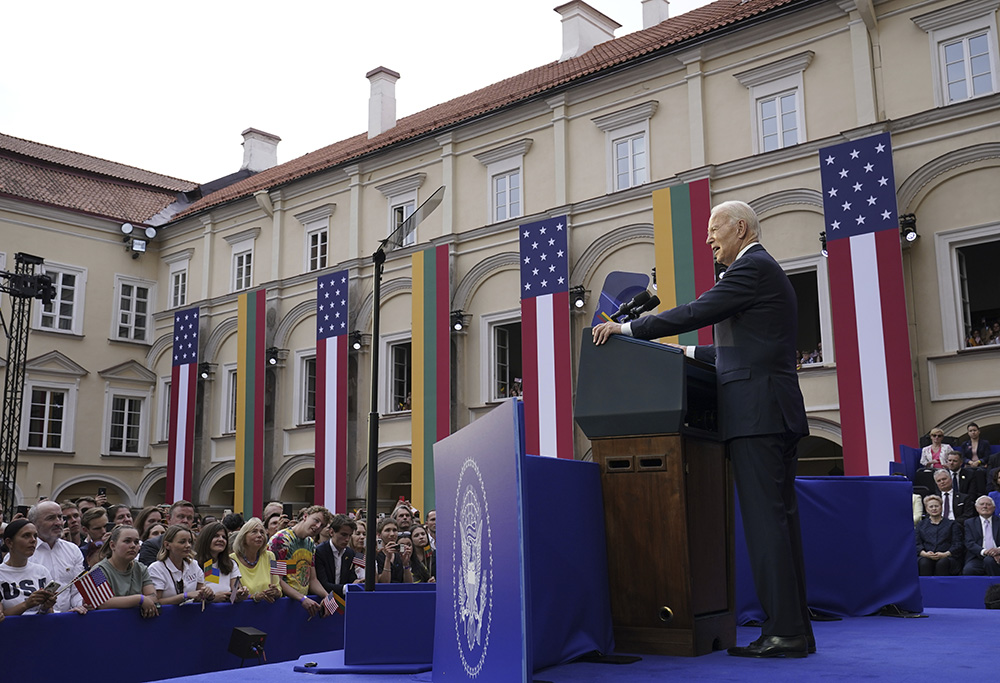
U.S. President Joe Biden speaks at Vilnius University in Vilnius, Lithuania, July 12 after attending the NATO summit. (AP/Susan Walsh)
President Joe Biden's trip to Lithuania for the July 11-12 NATO summit briefly turned the national focus from inflation and the culture wars to more foundational, political concerns. For a few days, the news led with the war in Ukraine again and with the expected accession of Finland into the NATO alliance and the not-so-expected approval of Sweden's entry. You didn't have to be jingoistic to feel good about seeing our president on the international stage defending freedom rather than cozying up to dictators.
The week began with foreboding. The president and his team were defending his decision to send cluster munitions to Ukraine, which was a significant mistake, morally and strategically. The fact their use is meant to hold Ukrainian forces over while more non-cluster munitions come down the pipeline does not ameliorate the cost in moral stature to the cause of decency and human dignity for which the Ukrainians are fighting.
Strategically, using weapons most of the world abhors does not help us stigmatize Russian President Vladimir Putin when he threatens to use tactical nuclear bombs. You can't just cross moral red lines because they are inconvenient.
I sympathize with the Ukrainians in their need. When one's homeland is being scorched, and bombs fall on civilian targets daily, the moral niceties of others can seem obscene. But the Ukrainians are fighting for ideas as well as their homeland, ideas about the value of democracy and international order.
Politics is not for the pure of heart, and war is politics at its worst, but there had to be another way to get the Ukrainian soldiers the munitions they need without recourse to these immoral cluster bombs.
The summit itself also seemed fraught as Ukraine demanded its entrance into the alliance now. President Volodymyr Zelenskyy labeled NATO's reluctance to let the embattled country join the alliance immediately "absurd."
Again, we can sympathize with his situation, and acknowledge it is his job to push and push and push for more help. But Article V of the NATO charter pledges all signatories to go to war if any member is invaded.
In his speech to Congress last December, Zelenskyy said, "Ukraine never asked the American soldiers to fight on our land instead of us." Letting Ukraine join NATO now would reverse that statement.
At the end of the summit, Biden gave a speech in Vilnius on July 12 that was as fine a defense of our international policy and commitment to NATO as we have heard in a long time. Those policies and commitments are not morally uncomplicated, to be sure, but they have stood the test of time and the march of history.
"Today, our alliance remains a bulwark of global security and stability as it's been for more than seven decades," the president said. "NATO is stronger, more energized, and, yes, more united than ever in its history. Indeed, more vital to our shared future."
He added, "It didn't happen by accident. It wasn't inevitable."
Security and stability are rarely given the respect they are due in moral analysis. People mount the barricades for liberty, fraternity and equality. The struggle for justice stirs many souls. Revisionist historians I read in college saw security and stability as vehicles for American hegemony. The George W. Bush administration believed security and stability stood in the way of the freedom of the Iraqi people. Trumpian anti-globalists deny them any value whatsoever.
Advertisement
The truth is that when security and stability are withdrawn, it is always the poor who suffer the most. It is always the simple people who end up as cannon fodder. The rich and well-connected manage to survive any system and any change of system. The long, often tiring work of diplomacy — "It didn't happen by accident" — is one of the most morally consequential jobs of government.
Biden went on to link the values that animate Western democracies to the goals of stability and security. The alliance, he said, is "bound by democratic values to make us strong and by our sacred oath that an attack against one is an attack against all. Because each member of NATO knows that the strength of our people and the power of our unity cannot be denied."
He spoke these words in Lithuania, a country for which the 20th century was a long catalog of wars fought against fascist and communist ideologies. People in Lithuania — and Poland, and Estonia, and the Czech Republic, and Latvia, and on — do not see Western democracy as a sham. They do not take kindly to those who subvert its legitimacy. They understand what is at stake in Ukraine, that sovereignty is linked with human dignity, stability is joined to human freedom, and security is essential for the pursuit of other human ends.
Politics is often called the art of the possible. Politicians must make compromises all the time to achieve what can be done. Voltaire introduced the Italian aphorism "Il meglio è nemico del bene" into the lexicon of the Enlightenment, which we usually translate as "Don't let the perfect be the enemy of the good."
This week, at the NATO summit, the president and other leaders of what is, after all, a military alliance, did a pretty good job balancing interests and values, stability and the defense of democracy.
It is nice to have a president who does not publicly throw his own intelligence agencies under the bus in order to appease a thug like Putin, as Trump infamously did. It is nice to have a president who understands that NATO is still a necessity, morally and politically.





